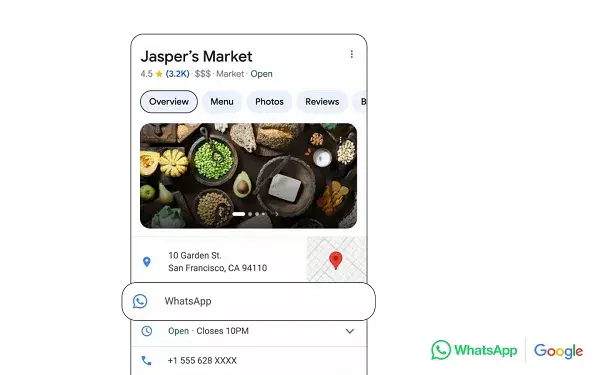Meta’s aggressive expansion into integrated messaging platforms signals a pivotal moment in digital commerce. At first glance, these innovations might appear to be a boon for consumers and businesses alike—more seamless, immediate, and personalized interactions. Yet, beneath this shiny veneer lies a more insidious reality. Meta is not merely evolving its offerings; it is subtly asserting dominance over the digital communication landscape, asserting a level of control that raises serious concerns about consumer autonomy and the future of open, competitive markets.
By embedding WhatsApp contact buttons into Google Search and Maps, Meta’s strategy effectively centralizes the customer journey. Consumers are increasingly directed to Meta’s ecosystem — not through choice but through an orchestrated convenience that erodes alternatives. While convenience is typically heralded as a virtue, in this context, it serves as a tool for Meta to monopolize interaction channels, reducing consumers’ ability to choose independent or competing services. This drive toward a more integrated, platform-centric approach beguiles users with the promise of efficiency, but it simultaneously limits their freedom to communicate freely across diverse platforms.
Furthermore, the emphasis on outcome-driven advertising and measurable engagement—turning messaging into a revenue-generating tool—shifts the paradigm from genuine customer service to a transactional, performance-oriented model. This transformation may sound advantageous, but it risks reducing consumers’ interactions to data points, with their preferences and behaviors meticulously tracked and monetized. Meta’s focus on integrating order tracking, verification, and automation might enhance efficiency, yet it also consolidates control over consumer data in the hands of a single corporate entity whose primary interest is profit maximization. This monopolization under the guise of technological progress presents a stark reality: user data, behavioral insights, and even conversational content are all tools for Meta’s expanding empire.
The Double-Edged Sword of Automation and AI
The introduction of AI-powered tools — transcriptions, call summaries, automated responses — suggests a future where human interactions are increasingly supplanted by machine intelligence. While automation promises efficiency and scalability, it inherently threatens the authenticity that defines meaningful communication. When customers are funneled through AI-enhanced channels, their experiences risk becoming transactional and impersonal, eroding the human touch that underpins trust and loyalty.
Even more troubling is the potential for such automation to be weaponized against consumer interests. Automated data analysis could enable Meta and associated businesses to craft hyper-personalized marketing strategies that manipulate consumer cravings and fears. The danger is that consumers, often unaware, are nudged along a path curated by algorithms designed to maximize profit rather than serve genuine needs. The opacity surrounding these AI tools compounds the issue—users seldom fully understand how their conversations are being analyzed or how their data is being exploited, thus fostering a climate of skepticism and fear.
While it’s undeniable that automation and AI can streamline communication, their unchecked proliferation risks creating a dehumanized ecosystem. Society should be skeptical of the narrative that such developments are inherently progressive; instead, they should scrutinize whether these advancements genuinely serve the public interest or simply entrench corporate power.
Are Consumers Trading Privacy for Convenience?
Meta’s expansion into integrated messaging and commerce reflects a disturbing trend: the conflation of privacy with inconvenience. Consumers often claim they value their privacy, yet they willingly surrender personal data in exchange for the convenience of instant communication and effortless transactions. Meta’s platform cleverly exploits this paradox by embedding its services into everyday digital touchpoints, making it almost impossible for consumers to opt-out without sacrificing ease of use.
This strategic shift suggests that privacy might become a secondary concern as consumers adjust to an environment where every digital interaction feeds into Meta’s sprawling data ecosystem. The danger here is comprehensive: as more interactions become encrypted but deeply integrated, the boundaries of consumer privacy become blurred, if not entirely obliterated. Data that used to be isolated within individual apps now flows freely across platforms, creating a centralized repository of behavioral insights that dramatically amplifies Meta’s market power.
From a center-right perspective, this trend raises serious questions about the balance between technological progress and individual rights. While innovation fuels economic growth, unchecked corporate intrusion into personal lives undermines the very foundation of consumer sovereignty. If consumers’ digital footprints are subtly manipulated or monitored under the guise of enhanced service, it diminishes their ability to make autonomous choices.
The Future is Bright or Bleak? It Depends on Who Holds the Power
Meta’s ambitions reflect a broader shift toward platform-centric control, where dominant players dictate the terms of digital interaction. Their vision for integrated messaging and seamless commerce aligns with a future where, ultimately, a handful of companies could control the majority of online consumer engagement. This monopolization is not a coincidence but a calculated effort to consolidate power, marginalizing smaller competitors and forcing users into ecosystems that serve corporate interests more than genuine consumer needs.
For center-right liberals who advocate free markets with responsible regulation, this scenario presents a stark warning: without proper oversight, the digital marketplace risks becoming a battleground where consumer choice and privacy are sacrificed at the altar of corporate profit. It underscores the importance of maintaining competitive neutrality and enforcing robust data privacy standards.
To navigate this future, businesses must resist the allure of short-term gains from total platform dependence. Embracing a diverse, multi-platform digital strategy fueled by ethical data practices can counterbalance Meta’s looming dominance. Yet, that requires a discernible shift in how companies perceive their role—not merely as profit engines but as stewards of consumer trust and market integrity.
Instead of surrendering control to Meta’s technological offerings, a sustainable path lies in fostering transparency, promoting consumer rights, and encouraging innovation outside the shadow of monopolistic giants. Only by actively resisting the concentration of power can we preserve enough space for competition, choice, and privacy in an increasingly consolidated digital landscape. Ultimately, the question isn’t just whether Meta’s messaging ambitions are successful—it’s whether society is willing to sacrifice its autonomy in pursuit of convenience.









Leave a Reply